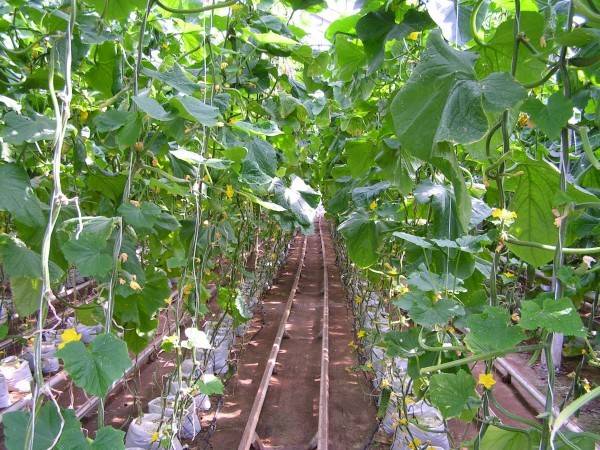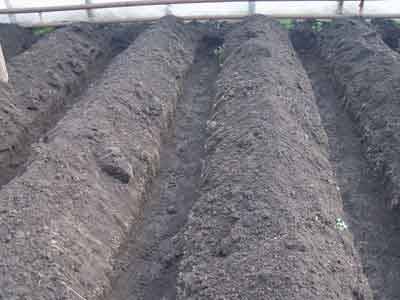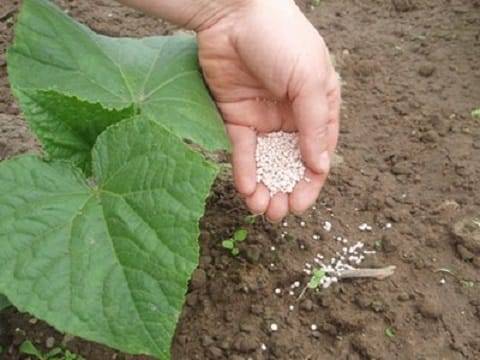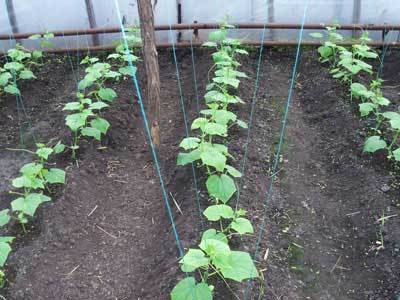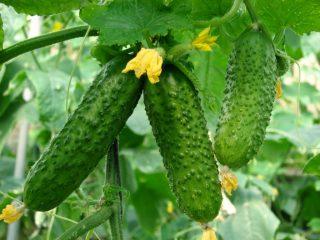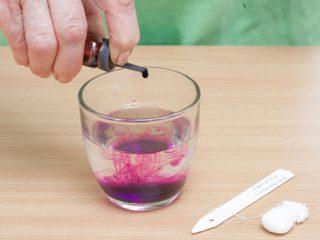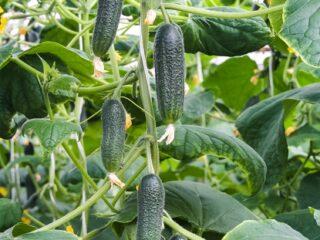Content
With agrotechnical cultivation cucumbers in the greenhouse today many are familiar, because many people are engaged in the cultivation of this culture in greenhouse conditions. The main reason why this method is so popular is that the greenhouse allows you to increase the fruiting period of this crop. Therefore, the summer resident can provide himself with fresh cucumbers not only in summer, but also in autumn. And if you approach the choice of varieties correctly, then this activity can become an additional source of income.
Preparing the soil for growing cucumbers
The yield of cucumbers largely depends on many factors and on the soil. If you have already managed to get a greenhouse, then you can prepare the soil. There are many options to offer here, but keep in mind that you should end up with fertile land. In order not to fuss in the spring, it is advisable to start preparing the soil in the fall, after the next harvest. For the cultivation of cucumbers, sowing of siderates before winter is required: wheat or rye. After waiting for the moment when the winter crops become strong, they are dug up and additionally introduced into the ground 4 kg superphosphate and 3 kg of wood ash per 10 m². This completes the autumn soil preparation.
It is also useful to disinfect the soil before planting: for this, a mixture of potassium permanganate and lime is prepared in accordance with the following proportions: for 15 liters of water you need to take 6 g of manganese and for 6 liters of water 20 g of lime.
The most time-consuming part of soil preparation is planned for the spring: it is necessary to dig a trench up to 25 cm deep at the chosen place.A compost or humus is placed on the bottom with a layer of 15 cm and a little greenhouse soil.
Rules for planting cucumber seeds for seedlings
An equally important step in growing cucumbers in a greenhouse is sowing seeds. Peat pots are best suited for this, which must first be filled with nutritious soil. Also, instead of them, you can use peat tablets or plastic cups available to everyone. If you have time, you can make paper cups. In general, the last word should be for the gardener.
But if you decide to use plastic containers for growing seedlings, then drainage holes must be made in them before filling with soil. In each glass, two seeds are sown to a depth of no more than 1.5 cm.
It is also necessary to resolve the issue of nutrient soil for sowing cucumber seeds. You can buy it in specialized shops for the gardener or prepare it yourself. If you chose the latter, then you can use one of the following soil mixture options, which can be prepared at home:
- Take equal amounts of peat, sawdust and turf. Add 1 cup wood ash to the bucket.
- A mixture for sowing seeds can be prepared from peat and humus, taken in equal proportions. Put 1 glass of wood ash on the bucket of the mixture.
- You can prepare a mixture of 2 parts of peat, the same amount of humus and 1 part of fine sawdust. Additionally, add 3 tbsp to a bucket of mixture. l. wood ash and 1 tbsp. l. nitrophosphate.
To increase the fertility of the planting soil, a sodium humate solution is required. To prepare it, you need to take 1 tbsp. l. preparation and dissolve in a bucket of water. It is necessary to heat the finished solution to a temperature of +50 ° C and pour it over the soil mixture, into which the seeds will be sown. Often, after watering, the land begins to sink.In this case, you will have to fill up the earth to fill the full volume of the cups. When the seeds are in the planting container, they need to be covered with plastic wrap, which will help create an optimal microclimate for germination.
To accelerate seed germination, it is necessary to maintain the temperature at + 22 ... + 28 ° C. With the appearance of cucumber sprouts, you need to lower the temperature: during the day it should not be higher than + 15 ... + 16 ° С, and at night - + 12 ... + 14 ° С. The process of growing seedlings takes little time and lasts a maximum of 25 days. It is very important that the fluctuations between day and night temperatures are significant - this will help speed up the formation of the root system of the plants.
How to grow cucumbers in greenhouse conditions
Having finished sowing the seeds, you must wait for their germination. After that, the covering material is removed due to uselessness. From this moment, the temperature is lowered to +20 ° C. This will avoid pulling the seedlings out.
7 days after sowing, a dive begins. Simultaneously with this operation, it is necessary to carry out decimation with the removal of weak inputs. Until it's time for a transplant cucumber seedlings in the greenhouse, water it several times and add soil to the pots if necessary. According to the rules of agricultural technology for growing cucumbers, during the formation of seedlings, it is necessary to make additional fertilizing, regardless of the level of fertility of the soil used for sowing seeds.
Until the weather is favorable for transplanting seedlings into the greenhouse, the plants must be fed several times. For the first time, fertilizers are applied when the first true leaf appears. Experts recommend using organic or mineral fertilizers in liquid form. For better assimilation by plants, fertilizers are combined with watering, and it is advisable to carry out this procedure in the morning. After 2-3 weeks, the second feeding is started. Usually it is timed to the formation at the seedlings of the second true leaf. For the third time, fertilizers are applied immediately before transplanting seedlings into the greenhouse, a few days before the scheduled date.
How to fertilize seedlings
It is very difficult, and sometimes almost impossible, to grow a good harvest in greenhouses without additional fertilizing. Therefore, they need to be carried out not only at the stage of growing in a greenhouse, but also during the formation of seedlings. It has already been said above that fertilizers are applied for seedlings 3 times. For the first time, a mixture of mineral and organic fertilizers is used:
- Superphosphate (20 g).
- Manure solution. To prepare it, you need to dilute 1 bucket of useful slurry in the same amount of water.
Poultry manure can be used instead of slurry. True, in this case you need to change the proportions, 1:10. However, you can save time and buy ready-made fertilizer in the store for the summer resident, for example, potassium humate, sodium humate or the like. When the time comes for the next feeding, the dose of fertilizer must be increased. The second time, the seedlings can be fed with nitrophos: it must be applied in a form diluted in a bucket of water during watering. During the first and second fertilizing, it is necessary to adhere to the following fertilizer consumption scheme: 2 liters per 1 m² of plantings.
When it's time to fertilize for the third time, you can prepare the following top dressing:
- superphosphate (40 g);
- urea (15 g);
- potassium salt (10 g);
- a bucket of water (10 l).
Top dressing prepared according to the above recipe is applied according to the scheme: 5 liters per 1 m² of plantings. Each time, top dressing must be completed by watering with plain clean water. You need to do this very carefully and make sure that fertilizers do not get on the leaves of the seedlings. But if this does happen, then immediately wash off the solution with warm water.
Planting cucumber seedlings in a greenhouse
Growing cucumber seedlings for a greenhouse takes no more than 25 days, you can find out about this by the formation of 3-5 real leaves in plants. The cucumber is planted in rows, which should be located at a distance of 0.5 m from each other.The tapes are placed with a step of about 80 cm, the landing step should be 25 cm.
Before placing the plant in the hole, you need to put a handful of organic matter or mineral fertilizer on the bottom. After that, you should moisten the hole and transfer the peat pot to it. From above it is covered with soil and tamped. If you used other containers for growing seedlings, for example, plastic cups, then you need to carefully remove the plant along with the soil and transfer it to the hole. The transplant is completed with thorough watering and mulching of the top layer of the soil.
Cucumber growing technology
After transplanting seedlings, the summer resident needs to make every effort to create favorable conditions so that the plants can take root and start growing. It should be borne in mind that at each stage of development it is necessary to maintain a certain temperature.
Keep in mind that this crop does not tolerate extreme temperature fluctuations during the day.
In the first days after transplantation, the temperature must be maintained at + 20 ... + 22 ° С. When the seedlings take root, the temperature can be lowered to +19 ° C. If the temperature is initially lowered, then this will seriously slow down the growth of seedlings. If, on the contrary, the temperature is maintained all the time, then the plants will spend most of their energy on the formation of foliage, which will negatively affect the harvest.
